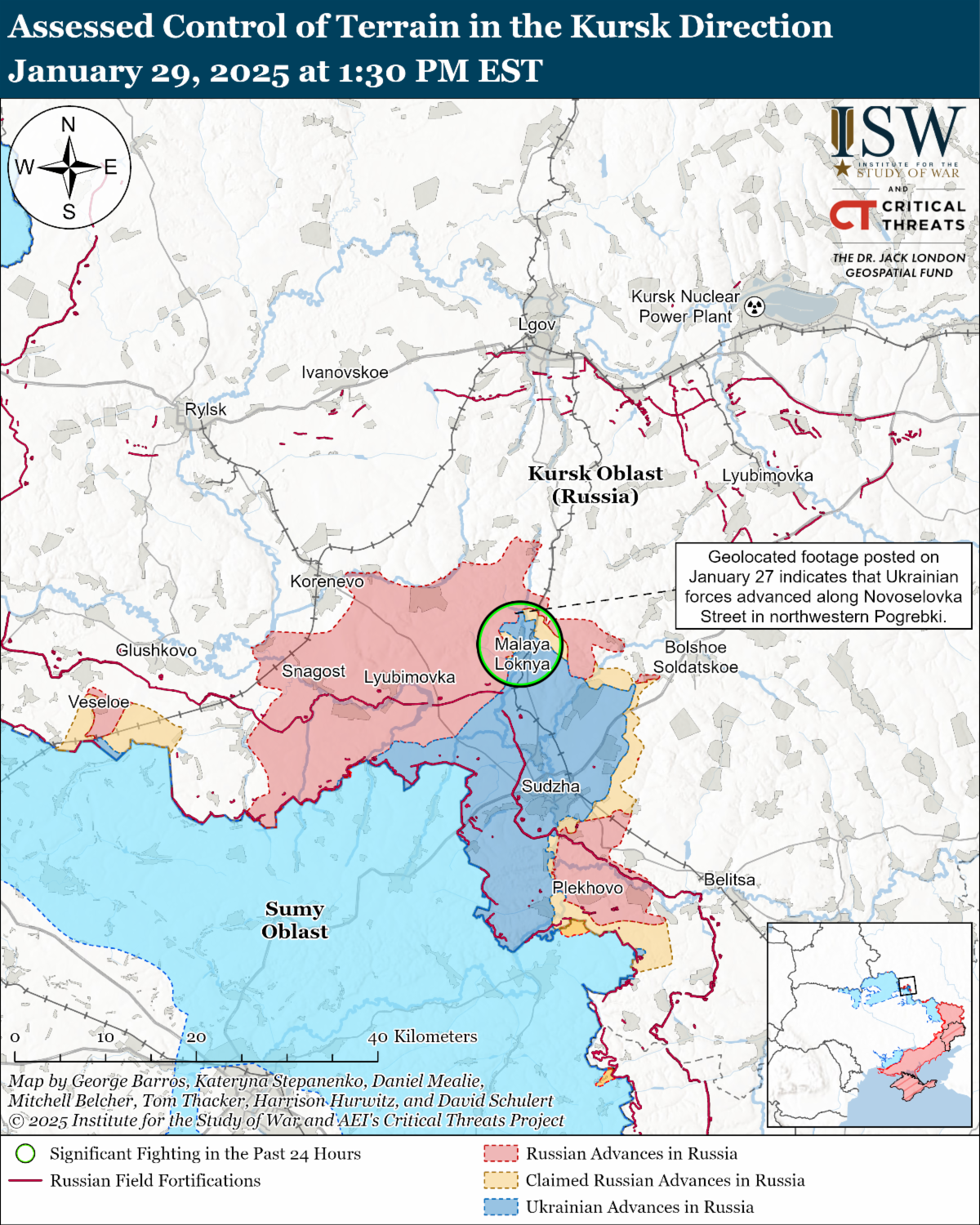Russian President Vladimir Putin stated that Western military assistance remains vital to Ukraine's ability to maintain its defense against Russian aggression. Putin gave an interview to Kremlin journalist Pavel Zarubin published on January 28 in which he claimed that the war in Ukraine could be over within two months if the West stops providing Ukraine with military assistance and that Ukraine's dependence on Western military aid indicates that Ukraine has "no sovereignty." Putin's claims about how quickly the war will end without further Western military assistance and his explicit rejection of Ukrainian sovereignty are a part of long-term Kremlin information operations aimed at undermining Western support for Ukraine and deterring additional Western military assistance. Putin is correct, however, that additional Western military assistance — particularly US military assistance — remains critical to maintaining and further developing Ukraine's warfighting capabilities. Ukrainian forces have consistently proven throughout the war that they can achieve operationally- and strategically significant battlefield victories when armed with sufficient quantities of US and other Western-provided military assistance. Ukrainian forces have also maintained stubborn defenses even when poorly provisioned and notably forced Russian forces to withdraw from Kyiv Oblast in April 2022 before significant deliveries of Western aid even arrived at the frontline and significantly slowed the pace of Russian offensive operations in Ukraine in Summer 2022. Putin and other Kremlin officials aim to portray Ukraine as weak and incapable of adequately leveraging Western-provided weapons at this critical moment in Western policy discussions about Ukraine — even though Ukraine has proven that it is anything but weak after fending off Russia for the almost three years of war.
Putin's longstanding theory of victory relies on the assumption that the West will abandon Ukraine, and only unwavering Western support and consistent deliveries of Western military assistance to Kyiv can force Putin to abandon his theory and accept the need to offer the concessions necessary for any resolution to the conflict acceptable to the United States, Europe, and Ukraine. ISW continues to assess that only the United States can provide Ukraine with some critical weapons and military equipment at the scale, speed, and regularity necessary for Ukraine's defense against Russia, and Western officials have recently proposed that European states increasingly assist in funding US military assistance to Ukraine.
Ukrainian forces conducted a drone strike at the Russian oil refinery in Kstovo, Nizhny Novgorod Oblast, and reportedly hit a Russian arsenal in Tver Oblast on the night of January 28 to 29. The Ukrainian General Staff reported on January 29 that elements of Ukraine's Main Military Intelligence Directorate (GUR) and Unmanned Systems Forces struck the Lukoil-Nizhegorodnefteorgsintez oil refinery in Kstovo and caused a fire. Ukrainian Center for Countering Disinformation Head Lieutenant Andriy Kovalenko posted footage of the oil refinery fire in Kstovo and reported that the refinery produces gasoline, diesel, aviation kerosene, and bitumen; processes 15 to 17 million tons of oil per year; and supports the Russian military. Geolocated footage posted on January 28 and 29 shows a fire at the Nizhny Novgorod Oil Refinery. Russian petrochemicals company Sibur-Ksotvo Enterprise reported on January 29 that Ukrainian drone debris struck the enterprise on the night of January 28 to 29, and Nizhny Novgorod Oblast Governor Gleb Nikitin acknowledged that drone debris started a fire in an industrial area. Russian opposition outlet Astra reported on January 29 that Ukrainian drones also struck the Russian Main Missile and Artillery Directorate of the Russian Ministry of Defense (MoD)'s 23rd Arsenal near Oktyabrsky, Tver Oblast, reportedly damaging an empty weapons storage building and three other buildings. Ukrainian forces previously struck the Russian 23rd Arsenal in September 2024.
Key Takeaways:
- Russian President Vladimir Putin stated that Western military assistance remains vital to Ukraine's ability to maintain its defense against Russian aggression.
- Putin's longstanding theory of victory relies on the assumption that the West will abandon Ukraine, and only unwavering Western support and consistent deliveries of Western military assistance to Kyiv can force Putin to abandon his theory and accept the need to offer the concessions necessary for any resolution to the conflict acceptable to the US, Europe, and Ukraine.
- Putin indicated that he will not view any peace agreement with Ukraine as binding by claiming that the Ukrainian government is either unwilling or unable to rescind the 2022 Ukrainian presidential decree banning negotiations with Putin.
- Putin's statements rejecting the legitimacy of the Ukrainian government and of a possible future peace agreement set conditions for Russia to justify violating any future agreements with Ukraine.
- Putin continues efforts to coerce US President Donald Trump into bilateral negotiations that exclude Ukraine, impose his desired negotiations framework on Trump, and compel Trump to inadvertently endorse ongoing Russian information operations about the illegitimacy of the current Ukrainian government.
- Ukrainian forces conducted a drone strike at the Russian oil refinery in Kstovo, Nizhny Novgorod Oblast and reportedly hit a Russian arsenal in Tver Oblast on the night of January 28 to 29.
- The Russian Ministry of Defense (MoD) confirmed in a post on January 29 that Lieutenant General Alexander Sanchik is the commander of the Russian Southern Grouping of Forces.
- Ukrainian forces recently advanced in Kursk Oblast and near Toretsk and Russian forces recently advanced near Lyman, Chasiv Yar, Toretsk, Pokrovsk, Kurakhove, Velyka Novosilka, Robotnye, and in the Dnipro direction.
- Volunteer recruitment rates in in Moscow have dropped sharply, as Russian citizens grow increasingly unwilling to serve in Ukraine.
| 




 [ISW] 러시아 공세 캠페인 평가, 2025년 1월 30일
[ISW] 러시아 공세 캠페인 평가, 2025년 1월 30일
 [ISW] 이란 업데이트, 2025년 1월 29일
[ISW] 이란 업데이트, 2025년 1월 29일